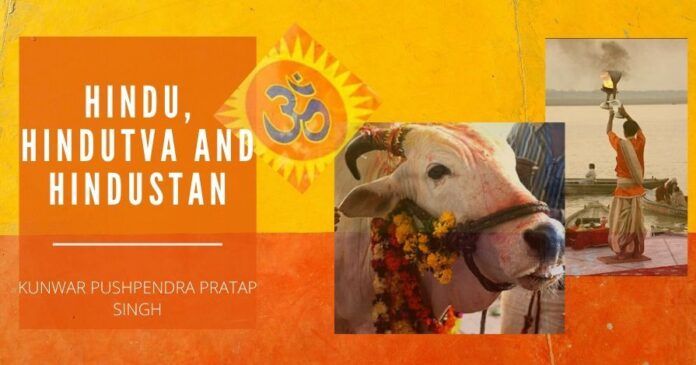
After all, what is Hindu and what kind of lifestyle does he inspire to live.
Amidst ongoing Corona crisis, Indian Hindus remembered and worshiped their Gods and Goddesses during the Hindu festivals. It is worthwhile to raise the topic of what Hinduism really is. The issue is contemporary because we are witnessing some strange human behavior by a section of people during the corona crisis and the lockdown. There is another topic which is often disseminated by a particular kind of intellectual class in our country; these ‘so-called intellectuals’ argue that instead of opening Hindu temples and Hindu ‘maths (मठ)’, hospitals and universities should be established. To understand both of these topics, it is crucial to understand what is Hindu and what kind of lifestyle is promoted through the ‘Hindu Philosophy’.
Both ‘Hindutva’ and ‘Hindu’ are terms derived from the word “Hindu”, Hindutva is an ‘element’ that is common to all the religions of all the Hindus. According to Savarkar Ji, anybody who has grown up in this land of India and whose religion has origin and reverence in this land of India should be considered as Hindu. This way, all those people who believe in the Vedas, or the concepts of Buddha, or Jainism, or the Sikhs, or the tribes living in the mountains are Hindus. Then what is “Hindutwa”? Simply put, as a “person” is identified with his “humanity (human values),” the soul of “Hindu” is “Hindutva”. Take an example where if a person does something wrong in society or does not come forward to help a poor or troubled person, and then we can say that the person does not possess “humanity” or the person is “inhuman”. So, Hindutva is the essence of all Hindu elements that reflect the Indian mind. You can easily imagine that if a person, intellectual or “Jamaat” does not trust “Hindutva”, how it would have been, what it would have looked like, particularly during the present Corona crisis and lockdown we could see, hear and witness whatever is happening in front of our eyes and it all does not require any proof at all.
Temples and maths (मठ) come to the fore to properly introduce the general Indian public to Hindu culture. “Hinduism” has already established its identity all over the world and many foreigners have adopted the Hindu way of life.
As far as the launching of hospitals and universities is concerned, there is no doubt that these institutions make significant contributions in terms of health and education respectively. The presence of Hindu ‘temples’ and ‘maths (मठ)’ provides further guidance and vision to the “Hindu society” from time- to- time and thus contributes to the “holistic” and “spiritual” development of human society. Particularly as the Indian Hindu society moves away from its culture and roots in modern times, these temples and maths (मठ) come to the fore to properly introduce the general Indian public to Hindu culture. “Hinduism” has already established its identity all over the world and many foreigners have adopted the Hindu way of life.
It is beyond comprehension when some of the so-called leftist, liberal and secular sections of the Indian society, at the time of this national crisis, often argue whether temples and religious places contribute in any manner, as much as hospitals and universities. While arguing on these issues, such intellectuals have already presumed that all types of diseases and patients, human health, and lifestyle are cured just by entering and consulting the hospital. They completely forget that the serious diseases occurring these days are associated with deeper issues related to human ethics – thoughts and lifestyle and it cannot be simply cured by going to the hospital and consulting doctors alone, for this, one needs to get into the depths of the subject. Likewise, the universities are not the “only” centers of knowledge acquisition. If that were the case, university students would not have gone to various coaching institutions or were not doing any course on the Internet. We know that, within a given time period, and inside a classroom, the lectures were given by the teachers often fail to make all-round development of the students and there is a need for much more evolved and improved approaches towards achieving a value-based education.
It is not that our people do not understand Hinduism, especially when a large number of people grow up listening to stories of Ramayana, Mahabharata, Upanishads, and Panchatantra. As the intellect of a common Indian grows over time, he or she realizes that Hinduism is a great spiritual path along with the yogic traditions of meditation, devotion, and insight, including rituals and prayers. In Hinduism, the “thinking”, “meditation” and “ultimate philosophy” matters much more than the “method” of worship. But, whenever there will a discussion at a global stage, on the topics of mantra, meditation, prana, kundalini, chakra, and self-realization, Hinduism will prove to be a unique religion in itself.
One does not necessarily have to be a “staunch Hindu” just because he/she is born in a Hindu family. But, outside the Hindu-way of life, this is not possible elsewhere.
If seen, Hinduism is a religion because it talks about God, soul, karma, sin, liberation, death, immortality. But due to some “natural principles” contained and “engraved” in the Hindu view, such as mercy, compassion, love for mother nature, respect for all forms of life, it has become a way of living a life, so it is more than just religion. In a book on the topic of “Indian Religions and their History,” the author Vachaspati Garola, speaks of Gandhiji, and mentions like the following:
“Gandhiji was of the opinion that logic and debate could not prove religion. Religion is an easy feeling, which has been incorporated into human life at an easy pace since time immemorial. He believed in the eternal beliefs of religion and wanted to make religion a medium for erasing political disputes.”
On one hand, the “pseudo-intellectuals” strongly oppose the establishment of the temple, the reason why they think so is complete very much mysterious, because, at the same time, they are strong supporters of the anti-national and anti-India narratives and ignore issues of urban Naxalism. Hindu temples and maths (मठ) are always at the forefront of donating for the welfare of governments and states, social organizations and the common public at large, also during the time of crisis; there is nothing hidden in it. In today’s times, the temple and Hindu maths (मठ) are strongly cooperating in this fight against the Coronavirus. On the other hand, there are hooligans in the society who are continuously doing something nasty at the time of the Corona crisis. These hooligans belong to a particular ideology and they are highly radicalized and do not respect the Hindu way of life.
The “Gandhi Wangmay,” Volume 23, page 516, explains the topic of “what is Hinduism” and “which person can be called a Hindu.” Gandhiji said that” if I have to explain Hinduism, that is to say, I would say this much – the search for truth by non-violent means. A person can call himself a Hindu despite not believing in God.”
Hindus have deep faith in their religion and its traditions. But some intellectuals like Shri Rajmohan Gandhi have expressed their views on the topic of “Meaning of being a Hindu”. Through one of his articles on the topic “Who is a good Hindu” in this book, he explains that:
“Being a Hindu means being a devotee of “Sadhus” and “Sadhvis” who have built monasteries in prominent places, while for some, a Hindu is one who does yoga or is a vegetarian or chants ” Hare Rama Hare Krishna.” Being a Hindu in this sense means habit, conduct, and nature rather than character.”
According to Purushottam Agarwal, “Hindutva” has failed to express the rich cultural heritage of India. This is a gross misconception. If someone takes pride in being a Hindu, then he cannot think of harm to society and can never keep narrow thinking. If a person is not proud of being a Hindu, then he will do what some anti-nationals do nowadays and that is nothing but unrestrained, false propaganda. If a Hindu becomes a fanatic only by the fact that he applies “tilak (तिलक),” goes to temple daily, or wears “Janeu (जनेऊ),” then such fanaticism should not matter to anyone. Anyway, many people of Hindu society prefers to worship in their own way. There is no “set rule”. One does not necessarily have to be a “staunch Hindu” just because he/she is born in a Hindu family. But, outside the Hindu-way of life, this is not possible elsewhere. Do not forget that, in the past, there have been many attacks on Hinduism, but in spite of all this, the significance of Hinduism has not diminished.
Gandhiji wrote in the issue of “Young India” in the October 6, 1921 issue, “I call myself a Sanatani Hindu because, I believe in all the literature in the name of Vedas, Upanishads, Puranas and Hindu scriptures, hence avatars and rebirths. I also believe in cow protection more broadly than its popular forms. Every Hindu believes in God and his uniqueness, I believe in rebirth and salvation.”
In “Gandhi Wangmay“, Volume 28, page 204, Gandhiji has been quoted as saying that “Hinduism will get the essence of every religion, what is not in it is baseless and unnecessary.” The word “Religion” for Gandhi Ji was a sign of “morality” and the word “Hindu” was related more with a particular faith and vision. On the one hand, in this corona crisis, there are many temples in the country that have announced their contributions in the fight against the Coronavirus crisis, while there is a sect that supports a group that is propagating the Coronaviruses across the country and involved with some “Markaz.” Not only spreading the Coronavirus, but it is also increasing the “trouble.” Some intellectuals, who have a myopic view and who could only see the fundamentalism of Hindus, but neither see nor understand the fundamentalism and superstitions of those involved in “Tablighi Jamaat“. The temples and Hindu maths (मठ) of the country are distributing food packets, dry food – logistic materials, masks, and sanitizers, in a situation of lockdown to prevent the spread of Corona infection.
There are strong reasons why we should give full credit to temples and maths (मठ). In connection with this Corona epidemic in Gorakhnath temple, Rashtriya Raksha Yagya was organized in the temple on the instructions of the monastery and the Chief Minister of Uttar Pradesh, Shri Yogi Adityanath Ji. On a daily basis, great efforts are made for the financially weak people by operating a kitchen, arranging stores, and distributing food packets. Gorakshpeeth has made important arrangements to provide 300 beds in the hospital located in Gorakhpur and Tulsipur of Balrampur for the treatment of corona infected persons. Here people can be treated by keeping them in “Quarantine”, Gorakhnath Hospital in Gorakhpur also has a 10-bed ventilated ICU. The “math (मठ)” also pledged to take some people to their homes at the time of lockdown in Gorakhpur. Gorakshapeethadhishwar CM Yogi Adityanath Ji broke the twenty-four-year-old tradition for public welfare by not attending the Gorakhnath temple on Ram Navami for the first time. Actually, the tradition of the “Nath Panth” is that it can deliver as much as possible for the country and public welfare by not being bound to any orthodox tradition.
This is the reason why I am presenting to you a list of those temples and monasteries which are proving that in the present, critical situation related to the Corona-crisis. All the temples and monasteries have announced their cooperation for the nation-building and public welfare, but the following list is only a beginning that highlights the sensitivity and human side of Hindu temples and monasteries.
Along with this, even if the doors of the Gorakhnath temple are closed to devotees in view of the lockdown amidst the Corona crisis, the temple- office is very much interested and ready to serve the people on the instructions of Yogi Adityanath Ji, around the clock. Some of the major lists are as follows:
- So far an amount of Rs.51 lakh has been given by the Gorakhnath Peeth, Maharana Pratap Shiksha Parishad, and other institutions related to the “Peeth” in the PM Care Fund and CM Distress Fund, till date.
- The Kashi Vishwanath Temple Trust, Varanasi distributed Rs 11 lakhs in the PM Care Fund and Rs 11 lakhs in the Chief Minister Distress Relief Fund, along with food and logistic supplies and packets of 1500 meals per day.
- A donation of Rs 51 crore was made by Maharashtra’s Shirdi Sai Baba Institute to the Chief Minister Relief Fund of Maharashtra. It has been announced by Yoga Guru Baba Ramdev and Patanjali Trust that they will support Rs 25 crore in PM Care and along with it all the employees of Patanjali and Ruchi Soya will also donate their one day salary. Yoga guru Swami Ram Dev has also announced to give some of his ashrams for the treatment of corona patients, whose food will also be arranged by Patanjali.
- Swami Narayan temples spread all over Gujarat have contributed Rs 1.88 crore in total. Simultaneously, arrangements have been made to keep corona infected patients in isolation. Somnath Temple Trust of Gujarat has donated Rs 1 crore to the Chief Minister’s Relief Fund.
- The non-gazetted staff of Mata Vaishnav Devi Temple in Jammu and Kashmir, where one day’s salary while the gazetted staff of the Trust donated their two days salary to the state relief fund.
- Apart from this, the Shrine Board has handed over its Ashirvad complex for the treatment of Corona infected and are also distributing food items to the needy.
- The Mahakaleshwar Temple Trust of Ujjain has donated Rs 2.5 lakh to Prime Minister Relief Fund and Chief Minister Relief Fund.
- The Maa Mahamaya Mandir Trust of Bilaspur, Chhattisgarh has donated Rs 5.11 lakh to the Chief Minister’s Relief Fund and Rs 1.11 lakh to the Red Cross Society.
- The Shri Nitya Chintaharan Ganpati Trust, Ratlam, Madhya Pradesh has donated Rs. 1.11 lakh.
- The Kanchi Kamakoti Peeth has donated to Prime Minister Relief Fund and Tamil Nadu Chief Minister Relief Fund.
- The Radha Swami Satsang Beas Society donated Rs 2 crore in PM Care Relief Fund and Rs 1 crore in Chief Minister Relief Fund of Punjab, Haryana, Himachal Pradesh, Rajasthan, Delhi, and Rs 1 crore in Jammu and Kashmir Lieutenant Governor Relief Fund have been done.
- The Mahalakshmi Temple, Kolhapur, Maharashtra has donated Rs 2 crore, of which Rs 1.5 crore has been donated to the Chief Minister Relief Fund and other institutions.
The above list is still not complete because various sections of the Hindu society are donating continuously, but it definitely proves that Hindu society is committed to human defense and is always on the path of nation-building with imperfect faith in temples and monasteries, not those deposits which are human protectors. Far from being, even humans and humans do not understand anything in front of their ignorance, bigotry, and superstition and have become human-eaters.
So, there is a need for a Hindu-way of life and approaches, not only for the Indian people but for the entire world. On this point, the revered Guruji Shri Madhav Sadashiv Golwalkar once mentioned that Non-Hindus living in India, should adopt Hindu culture and language, learn to respect Hindu religion, promote the only idea that glorifies Hinduism, and only then, will the name of being a “foreigner” will be removed from them.
Note:
1. The views expressed here are those of the author and do not necessarily represent or reflect the views of PGurus.
- Nepal: Falling prey to Chinese intentions - May 18, 2020
- Hindu, Hindutva and Hindustan - April 27, 2020
- Countering Indian media fake news through a large scale PIB (India) fact check - April 23, 2020











Author forgot to click the profile picture i hindu dress… tantrik wala idea!
Accroding to New York Times 08 April 2020.
The characters like Tabligi Jamaat are treated as social rejects in Saudi Arabia, allowed to rot in ghettos around Mecca, Medina.
For decades these pseudo-intellectuals on high thrones (in clouds,floating dreams) received their crumbs, from Unemployables called politicians and their supplanted beggars in administration.
This class of entrepreneurs operates in an intellectual marketplace that ultimately serves the needs of the prevailing order, i.e. groups and/or powerful societies and states. They are profoundly dependent for material rewards and status on established institutions.
In this context, the production of contemporary intellectual output is much like any other modern economic activity.
Intellectual entrepreneurs in the contemporary world may display a superficial restlessness and root-less-ness that suggests cosmopolitan allegiances, but they are in fact firmly anchored to the prevailing structures of political, economic and social power.
These pseudo-intellectuals Parasites have tasted blood, have gotten used to receiving their crumbs for they deployed ‘Templates’ to mass-produce gobbledygook, which only they could understand, for the rest “they are analphabet”
These pseudos-intellectuals need to be sent for Vocational Training to become employable, Reeducation in psychology-reflections and Social-Integration Training centres.
There can never be a comparison between Hinduism which is a way of life & organised religion. Organised religion has hierarchy which is used to control people,bind them to certain rules and regulations,enslave them & use them to further the agenda of people at the top of the hierarchy.Hinduism on the other hand sets people free to explore god & spirituality.